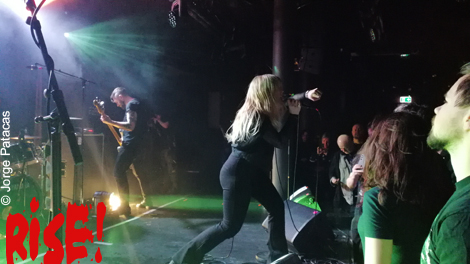by Jorge Patacas
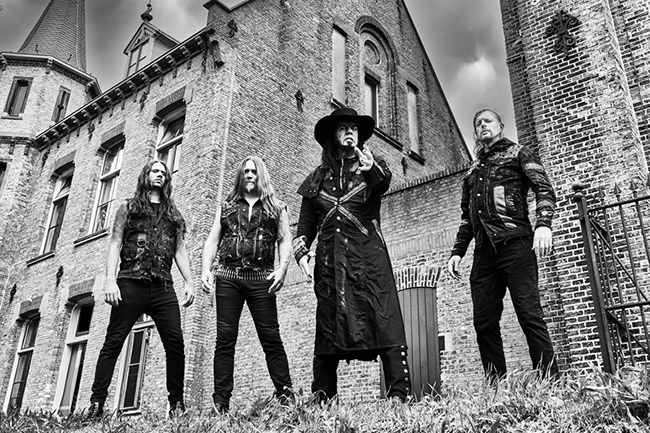
The former Morbid Angel frontman David Vincent has been very busy lately. Vltimas, his band with Rune “Blasphemer” Eriksen (ex Mayhem) and Flo Mounier (Cryptopsy), has recently released a second album called “Epic” and embarked on a European tour performing the songs live for the first time. Right after the tour, we had the chance to talk to Vincent about the album, his project I Am Morbid, his solo career as a country artist, his vocal technique, favorite books and more!
RISE!: – First of all, congratulations on your second album “Epic” that finally came out last month. I’ve noticed some differences on this album, for example in the guitar work, there are more solos and some more melodic parts, but even your vocals have some unexpected turns on this one. I can even hear traditional heavy metal vibes. Was this intentional or just happened naturally during the writing process?
David Vincent: This is a very organic writing process. We just got in a room and the ideas flow. That’s how we work.
R!: – You just came back from the European tour. I was able to see you live at Inferno Festival here in Norway last week. The new songs sounded great live and you even played some of my personal favorites from the new album like “Mephisto Manifesto” and “Invictus”. How comfortable have you felt playing the new songs live on the tour and what was the response from the audience in general?
DV: Well, you know, it’s interesting to me because the record was only out for a week while we were there, and I noticed that people were singing along with the new songs. And usually that takes a year or more. So yeah, it went really well. The response has been great. The fans have been super supportive. The reviews are great. The shows are going great. The band sounds great. I’m just really pleased and yeah, it’s interesting because we just go in and record songs and then we figure out what kind of set list we’re gonna have. And, you know, we’re all excited to play this stuff, although none of those songs from the new record had ever been played live. So we’re still tweaking the set a little bit. It’s nice to have too much material, we can’t play everything, so we can do pick and choose what we want to play on a given night. But the response has been great and I’m super happy about it.
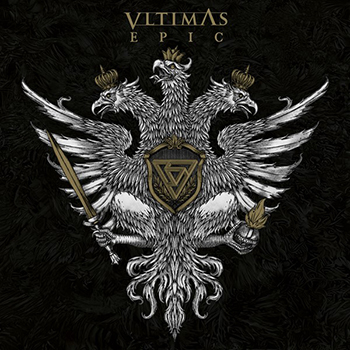
R!: – That leads me to another question, how do you usually deal with an unresponsive crowd?
DV: (He thinks for a few seconds) Well, thankfully I don’t really have that problem. Again, we go up and we do what we do, that’s all I can say. I mean, I am who I am, you know? I feel what I do. I put everything that I have and the whole band puts everything that they have into the performance. The response is good. I can’t imagine it being otherwise.
R!: – Personally I think “Miserere” was a great single, but I wanted to talk about the lyrics to “Invictus”. There is a poem by William Ernest Henley with the same name. I’m not sure if it’s inspired by that, but these lyrics definitely have to do with strength in the face of adversity.
DV: “Invictus” is a Latin term and it literally means “Undefeated”. It’s kind of a call to arms, really. There’s so many things, especially these days, everything is trying to tear somebody down. And if you believe that, if you fall into that, then you will be torn down. So this has been a message of mine since the very early days of Morbid Angel about personal strength, thinking for yourself and about being strong in the face of any kind of an adversarial situation. Strength is a good thing and it should be encouraged. That’s what we’re doing.
R!: – I remember you even said “Weakness should be canceled!” when introducing the song on the concert.
DV: You know, that was kind of a humorous thing.
R!: – Yeah, I know, but that was a funny way to refer to what you were saying, I think.
DV: Sometimes things are funny. I never know what I’m going to say. I just start talking.
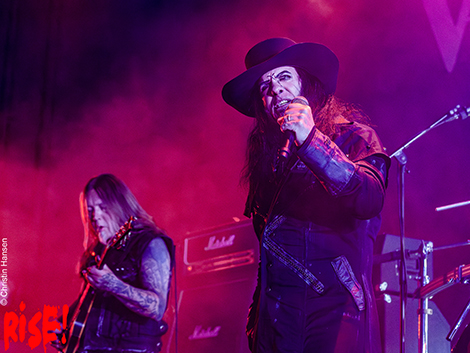
R!: – Did you write any more songs that were left off the album?
DV: We have probably another four or five. Basically we get in and record everything. We start working on things and listen to them and we’re like “you know, that one needs maybe a bit more work”, or maybe the way that it’s coming across is not exactly the way that we saw it. So we put it on the shelf for a while until we revisit it and get it maybe a little closer to what we had envisioned. I mean, it’s amazing how a full month in the studio goes by just like that. You run out of time and then it gets to the point where you have to pick the group of songs that really works well together. You know, we have lots of ideas.
R!: – You don’t play bass in this band. Was that the plan from the beginning?
DV: Yeah. I was going to play on the first record and I had an accident that caused me to not be able to play at all. My hand was completely unusable, so Blasphemer actually played bass on the first record, and then we hired a bass player to tour live, which that was the plan. But you know, he became a full band member and played bass on the new record. So I’m perfectly happy with it. He’s a great bass player, adds a lot to the band. And he works very hard, really cool guy. So, it’s a good thing.
R!: – A few years ago you started playing country music and even moved to Austin, Texas. Do you find more inspiration to write this type of music by living there?
DV: Well, I was inspired by a set of circumstances. I grew up listening to all kinds of stuff and I had some ideas for some songs. I have actually quite a lot of songs. I just like music. I like all kinds of music. Well, not all kinds. But you know, it’s nice to be able to do what I wanna do. I mean, at the end of the day, I’m a metal guy. I’ve always been. But some of these other things can be interesting.

R!: – What were your favorite country music artists when growing up?
DV: Well, I mean, the old guys. Waylon Jennings, David Allan Coe, Johnny Cash, George Jones, Willie Nelson. What I heard on the radio and you know? What your parents are listening to and this kind of stuff. So yeah, it’s not really the new stuff. I mean, there are some new artists that I like, but I think I could probably find artists that I like in any genre of music, just some that are more interesting to me and some that aren’t. Isn’t it great that there’s so many different types of music and so many different bands and artists to choose from?
R!: – Now you’re very busy with Vltimas and I Am Morbid, but do you have plans to tour with your country project in the future?
DV: It’s not off the table. I’ve done some shows, but it’s only special occasions. It’s a whole other set of circumstances with different musicians and different schedules.That’s kind of more of a hobby. But I’m not against it and that may happen. It’s just right now, as you noted, I’m super busy with everything else. And then of course I need relaxation time away from the cities and crowds and just with the family. So that’s a big balance.
R!: – A few years ago, you had the opportunity to join The Head Cat as their new bass player and vocalist replacing the mighty Lemmy Kilmister. How did you end up in the band? How did you meet those guys?
DV: Well, actually the guitar player for Head Cat is the guitar player who worked with me on the country stuff. He came up with an idea one day and asked if I would be interested in trying to do something like this and I said that I don’t sound anything like Lemmy. And he said that it was ok because it was just rockabilly and not Motorhead songs. And I was like “well, yeah”, but how do you replace Lemmy? You can’t, you know? Lemmy is one of those people who is irreplaceable. So, as a tribute to Lemmy, absolutely, not replacing. It’s impossible to replace Lemmy, I wouldn’t attempt it. I can’t imagine that anyone would try to attempt that.
R!: – Do you have any stories with Lemmy?
DV: We did some touring together back in the Morbid Angel days. Interesting fellow. I mean, I don’t know anybody who doesn’t like Motorhead. They’re loud. And he was a really interesting guy. He read a lot of books and knew a lot about a lot of things. I don’t know if everybody knows that, but he knew a lot about history and knew a lot about music of all genres. He was one of the good ones.
R!: – Morbid Angel’s “Altars of Madness” will always be considered a death metal classic album. It was a long time ago, but what do you remember from the sessions?
DV: Well, it was quick. It was a low budget. We were very well rehearsed. But, you know, getting in there and just trying to get everything done in the short amount of time that we could afford, it was tough. But we got it done and it certainly is something that I look back. I mean, I like all the records, I like everything that I’ve done for different reasons and that was kind of the thing that got us started, that particular recording. I guess I’m fortunate and I’m thankful that it’s considered to be relevant even today, 35 years later. It’s a long time.
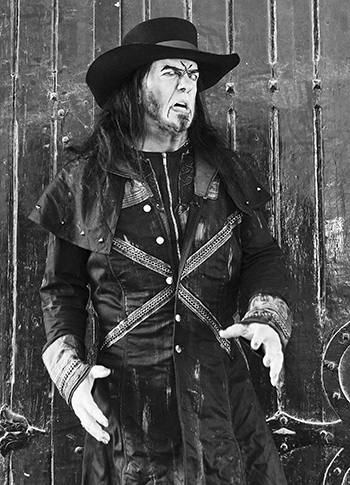
R!: – It was announced that I Am Morbid will be performing a special set of “Altars of Madness” in celebration of its 35th anniversary…
DV: I mean, we don’t do the whole record because we only have so much time and if we do themed tours, we maybe lean a little heavier on one record or another, depending on what the mood is. But I know what the audience wants to hear and we make sure and try to include everything that we can within the amount of time that we have to play.
R!: – You’re going to play some summer festivals in Europe with I Am Morbid, right?
DV: That’s true. My main focus is Vltimas, but we keep everything going and it keeps life interesting when you have other things that you can do also, and it still involves making music with people that you love.
R!: – A few months ago you were in South America with I Am Morbid, you even played in my home country Uruguay. How was the experience of playing down there? Any story you want to share?
DV: All of Latin America is very passionate. That was my first time in Uruguay. I was happy to go there and it was nice that we were able to fit that in amongst the tour. So hopefully, it’s something that we can get back to with Vltimas. That would be great.
R!: – Considering you have a very important role in the extreme metal scene, how do you see it today? I don’t know if you agree with me on this, but don’t you feel there’s an overwhelming number of bands repeating a formula nowadays? It kind of got to a point where it became extreme and brutal just for the sake of being extreme and brutal…
DV: I agree with you. You know? Back when we were just getting started with “Altars of Madness”, there weren’t so many bands. And everybody sounded different. I mean, Atheist sounded different than us, that sounded different than Chuck Schuldiner, that sounded different from Obituary, you know? The old school bands, everybody had their own style and you’d hear a couple of notes and you’d say “oh, I know who that band is”. These days it feels kind of more generic, there’s a lot that just seems like… you know, it’s one thing to be inspired by someone. I have those who are influences on me and and that have inspired me, but I don’t sound anything like them. I would always encourage people to find their own sound. I mean, it’s great that they’re a fan of this and the other thing, but if you wanna make a record, find your own sound. I mean, it can be done.
R!: – It can get worse if this AI madness is accepted in the scene… what’s your opinion on this? Do you have hope? Are you an optimistic, pessimistic or rather realistic kind of person?
DV: When it comes to AI in music, I don’t care. The AI cannot replace me. I assure you of that. It can’t think like me. It doesn’t have… unless somehow AI becomes emotional, but it can only be as emotional as the programmer that program. You can’t, you know? How do you learn passion? You have to feel it. How do you learn magic? You have to feel it. That’s an organic thing for me. So music, I don’t see it. It’s not for me. Let’s put it that way.
R!: – Exactly, there’s no passion or emotion in something generated by AI. But I guess it’s up to people if they accept it or not. Hopefully not.
DV: Well, I can’t imagine fans of the work that we do, accepting almost the opposite of anything that we stand for, which is organic, which is very personal, which is very spiritual. I mean, computers are good at what they’re good at and it’s a tool, but other than that, you know, I’m so old school… I don’t even care about that stuff or about being part of the conversation.
R!: – Have you ever thought about giving vocal lessons? You have such a unique vocal technique, so I’m sure people want to know how you do it and how you learned to sing like that.
DV: Trial and error. I took vocal lessons when I was young. My vocal coach told me “don’t try to do this or don’t try to do that. You’ll ruin your voice. This can’t be done”. And you know, obviously I’ve been doing it for 40 years and I’m as strong as I’ve ever been. So I don’t know really what to tell people. You know, everybody just has to find what’s right for them. I mean, the most important thing is breathing and how you breathe and how much air you use when you’re projecting. If you use a lot of air, then you’re gonna get worn out. I do what I do. It may or may not be right for anyone else, but it works for me.

R!: – You wrote a book together with Joel McIver called “I Am Morbid” that was published in 2020, but are you a reader yourself? What have you been reading lately?
DV: Not so much lately, but I did just buy a bunch of books. I’m gonna force myself to start reading more again. I used to read all the time, but you know? Life gets in the way of living. You have different interests and stuff. I mean, I do know how to read, that’s the first thing. But yeah, I’m into the kind of books that I’m into. I have read a lot and made myself a commitment to start doing that more.
R!: – What kind of books do you prefer?
DV: My go to is westerns. I really like the gritty ones. In addition to all the various occult and philosophy books, I like history. But from just a pure entertainment standpoint, westerns.
R!: – Is there anything you like besides country and rockabilly that might suprise people?
DV: I don’t know if it would surprise people or not. I like classical music quite a bit, but I think people can hear some of those influences in what I do. You know, it’s not so much about a genre for me. Like I said, there are genres that I prefer more than others, but if I hear music and I hear a singer who I believe is bearing his or her soul, I listen to the way they’re telling their story and how much passion is in it. That is what makes me like something. If I don’t hear that, chances are, I won’t like it.
R!: – What word would you use to describe your career? I would say integrity, but you can choose another word.
DV: I don’t know that there is one word, but integrity, I do feel that. Thank you for saying so, I’m going to take that as a compliment. So yeah, integrity, honor… Those things matter to me. So yeah, that’s certainly one of the words, but how many words can we sit here and talk about? Another word would be honesty.
R!: – Alright, thanks a lot for the interview!
DV: My pleasure. Take care man!
VLTIMAS DISCOGRAPHY
Something Wicked Marches In – 2019
Epic – 2024
VLTIMAS VIDEOS
“Miserere” (2023):
“Scorcher” (Visualizer) (2024):

